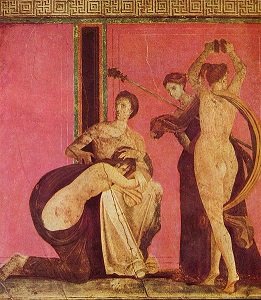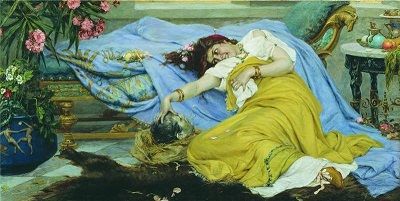Clodius, King of the Streets of Rome
The last century BC is regarded by some historians as one of the most pivotal times in the history of the world. At the time the great Roman Republic was in its final decline, with the absolute power that had been wielded by Gaius Marius and Lucius Cornelius Sulla during their bloody civil war suddenly visible to all as a prize to be fought over. It was during this time that the greatest of Romans vied for the fate of the Republic – Pompey and Caesar, Cicero and Crassus, names that became legends. But in every deck there lurks a joker – and nobody was more wild than Publius Claudius Pulcher
Clodius (as he would be most commonly known, for reasons that will become apparent later) was born in 93 BC as a member of the prestigious Claudia family. They were a Patrician clan, one of the most noble in Rome. His father Appius had sided with Sulla in the previous generation’s civil war, a choice which turned out to be the correct one once all the blood had finished flowing. As a result he served as Consul (one of the twin elected rulers of the Republic) in 79 BC, and as was traditional following his term was given a governership. He spent four years as governor of the province of Macedonia (the western half of modern Greece), with young Clodius still part of his household. In 76 BC, while Clodius was still legally a minor, Appius died.

Young Clodius, as with almost all Patrician men, went into the military when he came of age. Though he was the youngest son, his family connections (and doubtless some measure of talent) saw him rise to the rank of Legate, or General, during the Third Mithridatic War. It was a family affair – the overall commander of the Roman troops was his brother in law, Lucius Licinius Lucullus. Lucullus had little regard for Clodius, and the disrespect Clodius perceived drove him to attempt to mount a revolt. He had another brother in law in the region, Quintus Marcius Rex the governor of Cilicia, and he persuaded him to give him control of his fleet. Before he could mount his mutiny however, he was attacked and captured by pirates. They held him for ransom and sent a demand to the nearby King of Cyprus, a Roman ally named Ptolemy. However the sum sent by Ptolemy was so low the pirates, who had been listening to Clodius boast for a few weeks, thought it was such a good joke they returned the ransom and let Clodius go free. Much later, it would be clear he failed to see the funny side.
Clodius returned to Rome with a cloud over his head – not only was he worried that Lucullus knew about the mutiny, he was also allegedly afraid Lucullus knew that Clodius had been sleeping with his wife. (Who was Clodius’ sister – persistent rumours of incest with his sisters would be a theme with Clodius.) Seeking allies, he married a young woman named Fulvia from the Fulvia clan, who were a powerful and rich Plebian family. He also allied himself with Cicero’s faction in Rome, which made him an ally of Lucullus and thus less likely to be denounced. This was apparently sealed in 63 BC when the Catilinarian conspiracy, a plan to overthrow the elected rulers of Rome in a bloody coup, was foiled by Cicero. Clodius was one of those who acted as an unofficial bodyguard for the consuls, including Lucullus’ nephew Murena. Yet all of this was quickly undermined by one of his sisters, who made an ill-judged attempt to seduce Cicero in 63 BC. If Clodius put her up to it trying to strengthen his ties to to Cicero, it backfired dramatically. Cicero’s wife Terentia heard of it, and her counsel soon turned Cicero against Clodius. And he was about to put himself in a position where he was to regret making an enemy of Rome’s premier lawyer.

The cult of Bona Dea (the “Good Goddess”) is somewhat of an anomaly in classical Rome. Rather than the standard gods with a priesthood and open worship, the Good Goddess was worshipped in a less formal fashion – similar to the Greek mystery cults. The celebrations of Bona Dea were not part of the city’s normal ecclesiastical rites, and in fact they predated the earliest recorded history of the city. Even her name was a secret, known only to women and never recorded. [1] She did have a temple, where only women were permitted entry, and every year on the first of May they would hold a sacred celebration in this temple. This was one of two such celebrations held throughout the year, but the second (in December) was not held in the temple. Instead it was hosted by the wife of the chief magistrate, with the aid of Rome’s sacred Vestal Virgins. This year the chief magistrate was Rome’s High Priest, Gaius Julius Caesar. [2]
Quite why Clodius decided to infiltrate the Bona Dea festivities in 62 BC is a mystery. The main rumour at the time was that he did it in an attempt to seduce the hostess, Caesar’s wife Pompeia. The more likely reason is that he did it in an attempt to win some credit with Rome’s bohemian set, and set himself up as an iconoclast. Whyever it was, he disguised himself as a woman and slipped into the house. Unfortunately for him Caesar’s mother Aurelia was there determined to make sure that things went smoothly, and she immediately noticed this unusually tall and heavily cloaked woman. The rite of Bona Dea was a rare opportunity for Roman women to throw off the shackles of propriety, and as such masking your identity like that was very unusual. Aurelia had a servant girl follow Clodius, and she immediately noticed when he let his voice slip. She called him out on it, and he fled the scene. Though he was not definitively identified, everyone knew it was Clodius. The public outrage at his conduct (stoked by his bother in law, Lucullus) led to him being formally charged with this sacrilege the following year. The punishment for a man who witnessed the mysteries of the Good Goddess was to be blinded.

Clodius went into his trial with a serious enemy, and an unexpected ally. The enemy was Cicero, who spoke for the prosecution and who swiftly demolished Clodius’ initial defence that he was away from the city at the time. The ally was Caesar, who was canny enough to realise that by defending Clodius he would win his loyalty. [3] With Caesar came his ally Crassus, and the gold of Crassus was more than enough to secure Clodius’ acquittal. Perhaps sobered by how close he had come to blinding, Clodius decided to take politics a bit more seriously. How he chose to do so was, unsurprisingly, somewhat unique.
In 59 BC Clodius took the unprecedented step of renouncing his Patrician status, by having himself adopted into a Plebian family. This was a dubious legal step, made more dubious by Clodius’ conduct. Firstly, such adult adoption was only allowed for middle-aged men, while Clodius’ new “father” was only thirty years old – four years younger than Clodius. Secondly, such an adoption should have meant Clodius renouncing his family name and taking on that of his new “father”. Instead he simply changed the spelling from “Claudius” to “Clodius” – a non-existent name previously. Rather than joining an existing family, Clodius was in effect founding his own plebian family – all part of his plan.
What Clodius was seeking, and what he got, was the post of “Tribune of the Plebs”. This role had originally come about as a way to prevent the Patricians of Rome abusing their power. A Tribune was a Plebian elected by Plebians. They had several unrivalled powers, most of which stemmed from one simple fact – it was an automatic death sentence to harm a Tribune. Beyond this they had the power to veto the rulings of magistrates and acts of the Senate, and could also pass laws on matters that affected only Plebians. Clodius saw it as ripe for abuse, and despite the extremely dubious legal nature of his eligibility, he was elected in .

Naturally this escalated the enmity between Cicero and Clodius. This took a some what odd form on Cicero’s side, as his denunciations of Clodius often took the form of descriptions of his sexual escapades that have a certain…undertone. The frequent railings against Clodius as an effeminate arch-seducer of both men and women speak to a certain fascination with this aspect of his character, almost jealousy. Though whether this is of Clodius or of his conquests is hard to say. In 58 BC Clodius had Cicero exiled from the city, by passing a law retroactively criminalising some of his actions during the Catilinarian conspiracy. That wasn’t the only old score he settled – he used his influence to ensure that Cyprus was demoted from a client kingdom to a mere province, dethroning Ptolemy and revenging the insulting ransom he had provided. [5] Following that he set about using his office to build a powerbase. He won the eternal loyalty of the Plebs by instituting an official Dole of free grain to the poor, something that would become a key part of Roman life in the centuries to come. He also legalised associations “of a semi-political nature” – in other words, lower-class political pressure groups that could organise mob violence to order. Of course he himself led several such groups, and soon became the “king of the streets” of Rome.
His power started to wane when his relations with the Triumvirate began to fray. Clodius’ power went to his head, and rumours that Pompey planned to allow Cicero to return from from exile drove him to begin harassing him, reportedly even trying an assassination attempt. This made the Triumvirate realise they had created a monster. An attempt was made to recall Cicero from exile at the beginning of 57 BC, when Clodius’ term of office ended, but Clodius used his gangs to break up the meetings. Pompey was forced to allow the new tribunes, including a firebrand named Milo, to raise their own gangs in opposition to Clodius. This allowed the bill to finally be passed, and Cicero returned to cheers from Roman supporters. Clodius didn’t let him have an easy time of it, however – his gangs harassed the workmen trying to rebuild Cicero’s house (which he’d had demolished on a technicality while Tribune), and they burned down the house of Cicero’s brother as well.

Cicero struck back in 56 BC when Clodius’ sister Clodia Metelli was involved in a murder trial. She was a widow (there were rumours that she had poisoned her husband, though nothing was ever proven), and was notorious for taking lovers. One of these was Marcus Caelius Rufus, but the affair ended badly. Following this, Clodia accused Caelius of murdering an ambassador, and of attempting to poison her because she knew too much. Though Caelius was an enemy of his, Cicero defended him in order to humiliate Clodia. This he did by accusing her of prostitution and incest, then claiming that she had engineered the prosecution by sleeping with the prosecutor. Though these attacks were clearly both unfounded and irrelevant to the trial, the Roman justice system hinged far more on oratorial ability than “facts” and “evidence”. Because Cicero made his remarks in an amusing speech, Caelius was acquitted and Clodia’s reputation was ruined. [4] More importantly for Cicero, he had struck a blow against Clodius.
Milo and Clodius soon became bitter rivals, as they each fought for control of the Plebians. Clodius had himself elected to a minor public office in 57 BC, for example, to avoid being prosecuted by Milo. He then himself had Milo prosecuted for public violence. The violence in question consisted of fighting off the mobs Clodius had sent to smash his house up. The two men continued their private war for several years, until it reached its climax in 52 BC. The two men were travelling outside of the city, and their parties met “by chance”, and a scuffle broke out that escalated into a full blown battle. Later accounts would have it that one or the other was laying in ambush, of course. As a result of the fight Clodius was wounded, and he fled to a nearby inn. Milo won the battle, and he and his men then found the injured Clodius. Milo decided this was too good an opportunity to pass up, and had his men murder the defenceless man and abandon his body by the side of the road.

Of course, things didn’t end there. A traveller found and recognised Clodius’ body, and had it sent back to Rome. There his wife Fulvia organised his followers to take it and march on the senate’s meeting house, the Curia. There they drove the senators out before setting the building alight as a funeral pyre for their fallen leader. In response to this the Senate appointed Pompey to take on command of the city to restore order, an action which would lead inevitably to the Roman civil war that saw Caesar come to power. Milo was tried for the murder of Crassus, and Cicero (of course) spoke in his defence. The great orator was intimidated by the mob in the audience, and his delivery was unusually poor. Milo was convicted and exiled, a verdict which Pompey allegedly forced the jury to pass in order to quiet the streets. He, like many others, would perish in the decade of civil war that was to come. Fulvia married Mark Anthony, one of Caesar’s protegé, and brought Clodius’ gangs to his side. She may have prompted his enmity against Cicero, who he had executed in 43 BC. One story recounts that when the great orator’s head was put on display, she pulled out his tongue and jabbed it with a hairpin in revenge for the words it had spoken.
In many ways the story of Clodius parallels that of the end of the Republic. He began as a typical Patrician youth, in military service, before falling into the decadence that marked the disintegration of the traditional social order. As the old politics were superseded by outright violence (something which had begun much earlier) he gradually became less a politician, and more a gang lord. And in the end, like so many, he was consumed by the violence he created, relegated to a footnote in the tales of better men.
Images via Wikimedia. Banner is a detail from “The Romans of The Decadence” by Thomas Couture.
[1] Some writers say that it may have been “Fauna”, but there is no definitive proof of this. Others regard her as a transplanted Greek divinity, brought to Rome by travellers.
[2] Yes, that Caesar.
[3] Despite his defence of Clodius, Caesar still took advantage of the rumours of an affair to divorce Pompeia. His justification was that “the wife of Caesar must be above suspicion”.
[4] Interestingly Cicero’s wife, Terentia, had previously suspected that Clodia and Cicero were having an affair. This may have been another driver behind his attacks.
[5] He killed two birds with one stone on this – the work of incorporating Cyprus into the empire was given to Cato the Younger, a political enemy of his Triumvirate allies. This forced him to leave Rome and give them a free hand.
